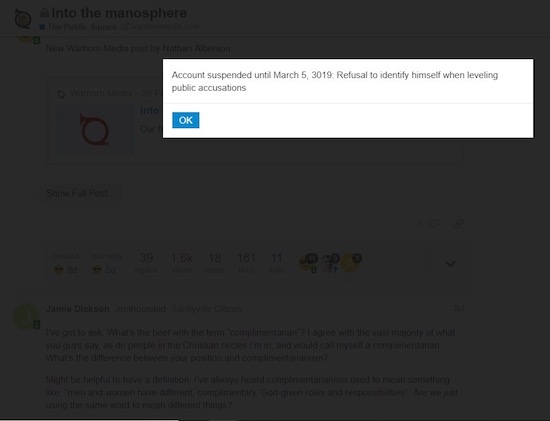
Despite having been banned from countless blogs and forums, ya boy Boxer has never scored the coveted thousand year ban. That honor goes to the worthy troll we know as Nereus, and was bestowed upon him by the closet queers over at Warhorn Media, who couldn’t handle the bantz.
The reason for this prize? Nereus refused to give his name and contact information to the hosts.
It begins to occur to me that nearly everyone who wants to spread the meme of anonymity as bad happen to be wimminz or their male feminist allies. Have you ever seen an anonymous female blogging online? Yeah, me neither. Wimminz must put their names and photos on everything.
Suppose I out myself tomorrow? Suppose I just start using my real name. Would the work of Nick Adams, who works at Chesapeake College for his day job, and who blogs on his off hours, be somehow more worthy than the work of Boxer, a ghost who pretends to write critical theory at the Frankfurt School? Would the metrosexual cruxtoid priests over at Warhorn Media suddenly give me more respect? What would the difference be?
Nereus is correct to withhold his real name and place of employment from these pretend friends of Jesus, and so is Dalrock. Their supposed respect means nothing when they prove themselves too lazy to even address the real issues, up for debate.
“metrosexual cruxtoid priests ”
LMAO!!!! That had me cracking up
The 1,000 year ban must be a joke cooked up by a millennial falcon.
Authority and leadership are antithetical with anonymity. Formally stated, if A is “anonymous” and B is “has authority or is a leader”, then the following is true:
However, the question above asks whether the inverse is true:
From the laws of logic, we know that the inverse is not a logical consequence of a proposition. For it to be true, the inverse’s contrapositive would also have to be true:
That is, “if you don’t have have authority and are not a leader, then you are anonymous.” This is plainly false, therefore ?A . B is false, so expecting a difference outcome because you out yourself is not logically justified. Revealing your identity is only a prerequisite to leadership and authority.
If you are not a Christian (i.e. under additional obligations) and not seeking leadership/authority, then my argument does not preclude anonymity.
@Boxer
Since we are agreeing to cite this Wikipedia article for this casual formal argument, let’s consider your argument to see if it makes my argument logically unsound. The argument can be stated like this:
I have multiple responses to this claim. Let’s consider some selected quotes.
First. The authors were not truly anonymous. They were at least understood to be the anonymous identities of a small group of known individuals. They were not random individuals. This association alone gave them implied authority through their implied group identity. Furthermore, some observers were even able to deduce who they were specifically, granting them explicit authority. Therefore, the Federalist Papers are not sufficient evidence to show that any authority wielded was derived from anonymous content rather than their presumed or deduced identities.
In anticipation of a counter-argument, consider the case where the real identity of the non-anonymous source wields leadership and authority (e.g. ghost written books by politicians; hoaxes; Texan family man persona). These have authority granted based off the strength of their perceived identity. That identity could be incorrect (or questioned), but it proves that identity is still required for authority. Mistaken identity is still identity. This is why authority is instantly lost if a hoax identity is revealed.
Second. It is not established that the Federalist Papers were treated with the level of leadership and authority claimed. Indeed, it is likely that the anonymity is the reason why the success of the goal is questionable. In other words, anonymity impeded authority and leadership. Therefore, this is evidence in favor of my proposition, not evidence against it.
Third. I.ve noted a difference between pure anonymity and pseudonymity in our previous discussions. The Federalist Papers qualify as pure anonymity in that their content is divorced from personal anecdotes and appeals to personal authority. Compare this to someone, like Dalrock, with a carefully crafted personal persona that may or may not be real and is referenced in the content. The perceived identity is use to legitimize authority, but it.s necessarily shaky and thus ineffective. If there is a possible counter to my argument it is pure anonymity, but there are still significant hurdles against this view.
Fourth. Let.s ignore everything above and say that the Federalist Papers are a rare exception to the rule, aberrations of the norm. This changes the formal deductive argument into an inductive logic / probability argument. If you go back and assign probabilities to the propositions, perhaps you could make a claim like this:
I.d be comfortable with this inductive inference. It adds some nuance to the argument, rather than being pure black and white, but it doesn.t really change the practical outcome much. Taking it into the
probability realm favors my argument, as the overwhelming historical standard for authority and leadership is identity. There are very few cases where anonymous works were granted permanent authority based solely on their content.